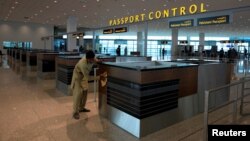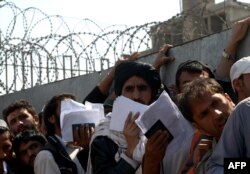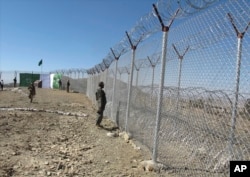Immigration authorities in Pakistan have stopped issuance of visas at airports and border crossings to citizens of neighboring Afghanistan, citing security concerns.
The abrupt cancellation of a longstanding "on arrival" visa facility for Afghan nationals comes amid an increase in terrorist attacks in Pakistan. Officials blamed fugitive militants hiding in and operating out of Afghan border areas for orchestrating the violence.
Until now, Afghans were being issued 30-day visas at entry points in Pakistan, but they will now be required to apply for a visa at Pakistani diplomatic missions in Afghanistan before traveling to the country.
Ismatullah Junejo, the director of the Immigration Wing at the Federal Investigation Agency (FIA) told reporters Thursday that under the revised policy, certain restrictions have also been placed on movement of Afghans visiting the country.
After entering the country, Afghan visitors would be required to fill out special registration forms to provide details of the duration and place of their stay in Pakistan, Junejo explained. The details, he said, would then be shared with relevant police stations for further verification.
Junejo added that the verification process would allow immigration authorities to issue a residence permit to the Afghan visa-holder and the visitor will be required to return the permit before leaving Pakistan.
Pakistan also hosts around 3 million Afghan refugees who are allowed to stay in the country on special permits validating their refugee status.
Islamabad has long urged Afghanistan and international donors to arrange for the reparation of the displaced families as soon as possible.
Pakistani authorities say suspected militants, including those linked to the Taliban fighting Afghan and international forces on the other side of the border, use refugee communities as hiding places.
The nearly 2,600-kilometer, largely porous border between Pakistan and Afghanistan has traditionally been an open frontier with many regular crossings and hundreds of illegal entry points exploited by militants to stage attacks in both countries.
The Pakistani military launched a massive project of constructing a robust fence, new forts and outposts on the frontier in 2017 and it is expected to be completed by the end of this year. The security plan, officials maintain, would help address mutual concerns of cross-border terrorism and facilitate travelers moving in both directions on valid visas.
Afghan position
There was no immediate reaction available from the Afghan government to the new visa restrictions announced by Pakistan.
Afghan leaders have been critical of Pakistan's tightening of border controls and visa restrictions. They have also opposed the construction of the border fence, saying it would add to problems of divided families.
Afghanistan traditionally disputes the boundary line drawn during the former British colonial era. But Pakistan rejects those objections and says regularizing the movement of people in both directions would contribute to regional security.






